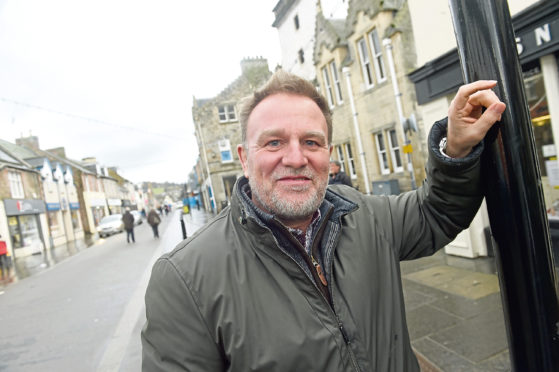Each week, we ask small businesses key questions. Here we speak to Keith Martin, managing director of Strathpeffer-based project management consultancy iPAc.
How and why did you start in business?
Born in Inverness, where I attended Crown Primary and Inverness Royal Academy, I graduated as a quantity surveyor in Dundee – while playing rugby for Highland – and then went overseas.
Serving for 18 years with a multinational engineering and construction company in Hong Kong and Singapore, I managed its Far Eastern design and construction business.
The company then sold up in the Far East, but through adversity comes opportunity and, with four young kids to support, I started my own business as a consultant and project manager in 2006.
How did you get to where you are today?
I had just registered my $1 company and the ink was still wet on my business cards when I pitched for a contract from the Singapore government, competing against the world’s largest consultants. I was selling “common sense” and got the job, managing the world’s largest public-private partnership in the centre of Singapore.
Covering more than 45 hectares (about 110 acres), the Sports Hub included a new national stadium, indoor and outdoor sports facilities, as well as extensive entertainment, and commercial and retail developments.
I thrived in the Far East’s intense, multiple-stakeholder environment and looked after the two biggest public-private partnership developments in Asia – the largest ever greenfield urban development in Malaysia, and the world’s largest smart city initiative in Saudi Arabia.
However, with our oldest daughter starting university, we decided to return to the Highlands in 2018, and today I run my development advisory business, iPAc Group, from a converted garage in our Strathpeffer home.
Who helped you?
Wife Monique is my long-time supporter and confidence booster. We’ve moved house six times and she keeps our very loving family of four children together.
The late Alistair Norrie, my boss when I started out in Inverness as a trainee, taught me that it’s OK to be human and fun, and not all about being corporate.
Business networks in Asia are far more big picture-focused than here, and also more co-operative and collaborative.
I progressed from one project to the next by building strong relationships and cutting through divisive silos.
Back home now, it’s hard even for a Highlander to break into the numerous geographic and organisational silos that abound here. Leadership doesn’t find traction.
Fortunately, the Federation of Small Businesses successfully cuts across sectors and silos, and gets directly involved in community-related issues, and we have conducted joint-development workshops.
What has been your biggest mistake?
I don’t make mistakes, I have learning experiences.
What is your greatest achievement?
My family. As regards my business, presenting the Singapore Sports Hub feasibility and delivery plans to the legendary Lee Kwan Yew, founding father of Singapore, and securing approval from the cabinet to proceed was wonderful.
If you were in power in government, what would you change?
Local government needs stronger public-private sector partnerships, much stronger commercial leadership and a focus on revenue generation rather than cost-cutting.
It’s clear from many conversations with business leaders and organisations, like the FSB, that partnerships with the private sector are essential, and that we must be more outward-looking. We have the building blocks necessary for success; we need the shared vision, skills, co-operation and commitment to put them together.
What do you still hope to achieve?
I want to apply all the knowledge and skills I gained in the Far East to the Highlands. We have an abundance of clean air, water and renewables – the essentials many other cities crave – and we must celebrate and promote them. Let’s make the Highlands great again.
What do you do to relax?
Family time, travel and all things rugby.
What are you reading, listening to or glued to on the TV?
I’m fascinated by Highland newspapers. There’s too much focus on the sensationally negative and not enough on the positive, especially community success.
We need a shift from problem-centric reporting to inspiring solution-centric thinking.
Having spent so much time overseas, I’m now catching up on classic UK comedy shows and sports documentaries.
What do you waste your money on?
Cars.
How would your friends describe you?
Positive, reliable, determined and always up for a laugh.
What would your enemies say about you?
That boy never gives up but he does take things a wee bit personally.
What do you drive and dream of driving?
We have a Jaguar, which reminds me of my sleek, powerful and beautiful wife, and also a Range Rover for the dog. I won’t say which I prefer. I’d love a Tesla Cybertruck.
